Lesson 3 Phil. Politics.pptx Power of the government
Download as PPTX, PDF0 likes30 views
Module 3 Power
1 of 19
Download to read offline



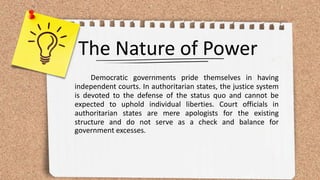




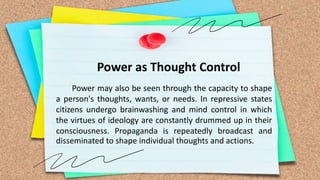










Recommended
Justice ,Law and Authority.ppt



Justice ,Law and Authority.pptBurhanuddinMShabbirT
╠²
The document discusses the concepts of political society, government, authority, and corruption. It defines political society as a group of people living in a territory with independence to better the lives of its members. A government or state is the administrative structure that coordinates society to achieve common goals for the citizens. Authority is the power to organize and direct a group, and is derived from knowledge and wisdom. Corruption occurs when public officials abuse their power for private gain, undermining the purposes of government. The document examines different forms of corruption and their negative effects on politics, economics, and society. It also discusses conditions like lack of transparency, accountability, and controls that enable corruption to thrive.POWER.pptx



POWER.pptxChristianMuli1
╠²
The document discusses the three faces or levels of power:
1) Issue power which is direct decision-making authority. This can be seen as an "open face".
2) Agenda power which is the ability to control and influence decisions by setting the agenda behind closed doors. This is a "secretive face".
3) Manipulation power which is using subtle psychological tactics to manipulate public opinion and shift values before a decision. This is a "deceptive face".
The three levels illustrate how easily power can become corrupt as politicians may compromise values for political gain. Understanding these faces is important, and one should be wary of cynicism while also avoiding manipulation when exercising power.Group-1-POWERPOINT (1).pptx



Group-1-POWERPOINT (1).pptxKeanBinas
╠²
The document discusses different aspects of political power. It defines power as the ability to influence and control decisions and events. It then describes the three main forms of power as coercion, authority, and influence. It also discusses the nature and dimensions of political power. Specifically, it states that political power is exercised in decision-making, non-decision-making, and ideological ways. Additionally, it outlines different types of power like legitimate, expert, reward, and coercive power and how they can lead to compliance, commitment, or resistance from others.Concept of power



Concept of powerMahesh Patil
╠²
This document discusses the concept of power through defining it, examining its various sources and types. It defines power as the ability to influence or control the behavior of others. Power can come from formal positions of authority, the ability to reward or punish others, expertise or knowledge, personality traits, or charisma. The document outlines several types of power including political power derived from government institutions, economic power from wealth and resources, ideological power through shaping beliefs, and military power through armed forces.Concept of power



Concept of powerMahesh Patil
╠²
This document discusses the concept of power through defining it, examining its nature and sources, and identifying different types. It begins by defining power as the ability to influence or control the behavior of others. It then explores the nature of power, noting it can stem from formal positions, personal attributes, or control over resources and information. The document outlines several types of power, including political power derived from government institutions, economic power from wealth and industry, ideological power through shaping beliefs, and military power through armed forces. Overall, the document provides an overview of power in social and political contexts.conceptofpower-170705120709.pptx



conceptofpower-170705120709.pptxssuserc9fbf21
╠²
Power refers to the ability to influence or control the behavior of individuals or groups. There are several types and sources of power. Political power comes from formal institutions like governments as well as informal groups. Economic power derives from the control of material resources and means of production. Ideological power maintains the existing social order through justifying ideologies. Military power is the armed forces and capabilities of a state. The document discusses definitions of power and explores the various types and sources of power including political, economic, ideological, and military power.theconceptofpower-191022155908.pdf



theconceptofpower-191022155908.pdfEidTahir
╠²
Power plays a huge role in politics, from decision making to interactions between political actors. Power can be defined as the ability to get someone to do something and make things happen as one wants. There are different types of power including organizational power derived from one's position, and personal power from one's characteristics. Power must be exercised carefully to avoid corruption and instead motivate followers toward group goals.The concept of power



The concept of powerOlen Grace Mendoza
╠²
Power plays a huge role in politics, from decision making to interactions between political actors. Power can be defined as the ability to get someone to do something and make things happen as one wants. There are different types of power including organizational power which comes from one's position, and personal power which comes from one's characteristics. Power must be exercised carefully to avoid corruption and instead motivate followers to accomplish group goals.Organizational politics word assignment



Organizational politics word assignmentSaad Khan
╠²
Organizations are social units structured to meet goals. They have management hierarchies that divide roles and responsibilities. Organizational politics refers to how competing interests are reconciled through non-rational processes. Authority is a manager's right to issue orders and see compliance, and comes from traditional norms, legal positions, or charisma. Power is the ability to influence others and make concerns count, and can involve coercion, rewards, or legitimacy. In organizations, politics involves maneuvering for responsibilities, rewards, and resources through impression management, extra-role relationships, coalitions, and bargaining.POWER.pptx



POWER.pptxLynSamonte1
╠²
This document defines power and discusses its nature, dimensions, types, and consequences. It defines power as the ability to control and influence others' behavior and direct events. Power can be expressed upward from subordinates to leaders or downward from leaders to subordinates. The document outlines three types of power: power over others through domination, power to act independently, and power with others through cooperation. It also discusses three dimensions of power: decision-making power, agenda-setting power, and ideological power to shape desires. Finally, it explores the potential consequences of power, including compliance, commitment, resistance, and conformity.SHS Powerpoint Power(POLITICS)



SHS Powerpoint Power(POLITICS)Walter Colega
╠²
The ability to influence or outright control the behaviour of people.
Power can be seen as evil or unjust, but the exercise of power is accepted as endemic to humans as social beings.
Power as a means to make social actions possible as much as it may contain or prevent them.
Power & politics



Power & politicstrisha_jia
╠²
Power refers to the ability to influence others through control of resources. It is an exchange relationship between an agent with power and a target to be influenced. Politics in organizations involves using power and social networks to benefit individuals or the organization. Organizational politics arises due to limited resources, ambiguous goals and decisions, and changing environments. It can have negative consequences like low job satisfaction, high stress, and goal displacement if used for personal gain rather than organizational objectives. Managing politics involves clearly defining jobs and rules to reduce ambiguity and favoritism, and ensuring rewards are based on objective performance criteria rather than political behavior.Chapter 13 Government & Law



Chapter 13 Government & LawEdmundo Dantes
╠²
This document discusses different forms of government and political systems. It begins by defining key concepts like the state, authority, legitimacy, and power. It then describes different forms of government like autocracy, oligarchy, and democracy. It discusses how power is acquired, exercised and maintained in different systems. The document also examines political institutions and processes in the Philippines, including the Marcos martial law era and several coup attempts in the post-Marcos period. Key causes of political instability are identified.Power, authority & political party



Power, authority & political partymahee tori
╠²
The document discusses power, authority, and political parties. It defines power as the ability to influence others and authority as the right to achieve organizational objectives and make decisions through others. Politics involves achieving and using power in a society through strategies and structures. Political institutions are important for the regular functioning of a country by establishing leadership succession. The political history of the world expanded from early governance systems to modern democratic and totalitarian systems. Government is the group that controls and makes decisions for a country, and there are different forms including monarchy, tyranny, democracy, and aristocracy/oligarchy.Chapter 14 powerpoint



Chapter 14 powerpointAdrian Christian Bulgan
╠²
The document discusses concepts related to government and political systems, including:
1) It defines the state as distinct from society and explains how the need for the state arose from groups realizing centralized authority was beneficial.
2) It outlines three main forms of government - autocracy, oligarchy, and democracy - and provides brief definitions and examples of each.
3) It explains various sources of legitimacy and authority for governments, including tradition, legal rationality, and charisma, and how influence and the struggle for power relate to these concepts.Power and Accountability.pptx



Power and Accountability.pptxClangClangObsequioAr
╠²
This document discusses the nature, forms, and consequences of power. It defines power as the ability to carry out one's will. Power in society is the ability of person/institution A to influence person/institution B to do something they would not otherwise do. Power in politics is closely related to the state, government, and citizenship. There are four major types of power: compulsory, institutional, structural, and productive. The consequences of power depend on how and to what degree it is exercised, and can include compliance, commitment, resistance, and abuse of power. Power has different forms depending on who is imposing it and how.It is Not Wisdom but Authority that Makes a Law. T ŌĆō Tymoff.pdf



It is Not Wisdom but Authority that Makes a Law. T ŌĆō Tymoff.pdfplasma donation
╠²
While authority gives power to enact and enforce laws, wisdom provides the moral and ethical foundation to create fair laws that benefit society. Without both, the legal system cannot function properly. Authority maintains order but risks autocracy if not balanced with wisdom, which considers people's needs and advances justice. Laws driven solely by authority can disproportionately impact vulnerable groups and restrict dissent, limiting a society's development. For a legal system to be effective and protect civil rights, authority and wisdom must cooperate.Concepts of Power and Authority and Sources of power-2.pptx



Concepts of Power and Authority and Sources of power-2.pptxASWATHYMV3
╠²
This document discusses concepts of power and authority in communities. It defines power as the ability to influence or compel the behavior of others, while authority is the legitimate right to command and make decisions. Sources of power in communities include resources, personality, group size, knowledge, skills, and media. Authority is derived from traditional roles, charismatic leadership in times of crisis, or legal rules and positions. The key difference between power and authority is that power resides with individuals based on personal traits, while authority resides with positions or roles and follows a legitimate hierarchy.Power and politics in organization



Power and politics in organizationlearner_j
╠²
A presentation on how managers acquire and use power in organisations and the impact of both power and politics in such organisationsPower and Politics in Organizational Life



Power and Politics in Organizational LifeAyush Man Tamrakar
╠²
1) The document summarizes a presentation on power and politics in organizational life. It discusses how power depends on accumulating influence over others to advance one's career and interests.
2) It describes different bases of power including formal power from one's position, as well as personal powers like expertise, resources, and relationships.
3) Politics in organizations involves using power to influence decisions and advantage in non-sanctioned ways. Most political actions are legitimate everyday behaviors while extreme actions risk sanctions.Bureaucracy



BureaucracyEmily Neff-Sharum
╠²
The document discusses bureaucracy and the preferences of different government institutions regarding bureaucratic structure. It notes that Congress prefers a decentralized, insulated bureaucracy due to electoral pressures, while the Presidency prefers a centralized bureaucracy they can control. Bureaucracies are able to make regulations because Congress has delegated that power to agencies. Sources of bureaucratic power include expertise, leadership, and support from interest groups. The document also discusses principal-agent problems that can arise in the relationship between elected officials and bureaucrats.Power



PowerJehnMarieSimon1
╠²
Power can take many forms and be used in both positive and negative ways. Power can be defined as the ability to influence or control others. It exists in four main types: power over others through force; power to enact change through one's own abilities; power with others through cooperation; and power within through self-worth. Additionally, power can be exercised openly through decision making, secretly by setting agendas, or subtly by shaping preferences and perceptions. The sources of power include reward, coercion, legitimate authority, charisma, and expertise. The effects of power depend on how it is used - it can motivate or corrupt depending on whether power holders act in self-interest or for the broader interest.More Related Content
Similar to Lesson 3 Phil. Politics.pptx Power of the government (20)
The concept of power



The concept of powerOlen Grace Mendoza
╠²
Power plays a huge role in politics, from decision making to interactions between political actors. Power can be defined as the ability to get someone to do something and make things happen as one wants. There are different types of power including organizational power which comes from one's position, and personal power which comes from one's characteristics. Power must be exercised carefully to avoid corruption and instead motivate followers to accomplish group goals.Organizational politics word assignment



Organizational politics word assignmentSaad Khan
╠²
Organizations are social units structured to meet goals. They have management hierarchies that divide roles and responsibilities. Organizational politics refers to how competing interests are reconciled through non-rational processes. Authority is a manager's right to issue orders and see compliance, and comes from traditional norms, legal positions, or charisma. Power is the ability to influence others and make concerns count, and can involve coercion, rewards, or legitimacy. In organizations, politics involves maneuvering for responsibilities, rewards, and resources through impression management, extra-role relationships, coalitions, and bargaining.POWER.pptx



POWER.pptxLynSamonte1
╠²
This document defines power and discusses its nature, dimensions, types, and consequences. It defines power as the ability to control and influence others' behavior and direct events. Power can be expressed upward from subordinates to leaders or downward from leaders to subordinates. The document outlines three types of power: power over others through domination, power to act independently, and power with others through cooperation. It also discusses three dimensions of power: decision-making power, agenda-setting power, and ideological power to shape desires. Finally, it explores the potential consequences of power, including compliance, commitment, resistance, and conformity.SHS Powerpoint Power(POLITICS)



SHS Powerpoint Power(POLITICS)Walter Colega
╠²
The ability to influence or outright control the behaviour of people.
Power can be seen as evil or unjust, but the exercise of power is accepted as endemic to humans as social beings.
Power as a means to make social actions possible as much as it may contain or prevent them.
Power & politics



Power & politicstrisha_jia
╠²
Power refers to the ability to influence others through control of resources. It is an exchange relationship between an agent with power and a target to be influenced. Politics in organizations involves using power and social networks to benefit individuals or the organization. Organizational politics arises due to limited resources, ambiguous goals and decisions, and changing environments. It can have negative consequences like low job satisfaction, high stress, and goal displacement if used for personal gain rather than organizational objectives. Managing politics involves clearly defining jobs and rules to reduce ambiguity and favoritism, and ensuring rewards are based on objective performance criteria rather than political behavior.Chapter 13 Government & Law



Chapter 13 Government & LawEdmundo Dantes
╠²
This document discusses different forms of government and political systems. It begins by defining key concepts like the state, authority, legitimacy, and power. It then describes different forms of government like autocracy, oligarchy, and democracy. It discusses how power is acquired, exercised and maintained in different systems. The document also examines political institutions and processes in the Philippines, including the Marcos martial law era and several coup attempts in the post-Marcos period. Key causes of political instability are identified.Power, authority & political party



Power, authority & political partymahee tori
╠²
The document discusses power, authority, and political parties. It defines power as the ability to influence others and authority as the right to achieve organizational objectives and make decisions through others. Politics involves achieving and using power in a society through strategies and structures. Political institutions are important for the regular functioning of a country by establishing leadership succession. The political history of the world expanded from early governance systems to modern democratic and totalitarian systems. Government is the group that controls and makes decisions for a country, and there are different forms including monarchy, tyranny, democracy, and aristocracy/oligarchy.Chapter 14 powerpoint



Chapter 14 powerpointAdrian Christian Bulgan
╠²
The document discusses concepts related to government and political systems, including:
1) It defines the state as distinct from society and explains how the need for the state arose from groups realizing centralized authority was beneficial.
2) It outlines three main forms of government - autocracy, oligarchy, and democracy - and provides brief definitions and examples of each.
3) It explains various sources of legitimacy and authority for governments, including tradition, legal rationality, and charisma, and how influence and the struggle for power relate to these concepts.Power and Accountability.pptx



Power and Accountability.pptxClangClangObsequioAr
╠²
This document discusses the nature, forms, and consequences of power. It defines power as the ability to carry out one's will. Power in society is the ability of person/institution A to influence person/institution B to do something they would not otherwise do. Power in politics is closely related to the state, government, and citizenship. There are four major types of power: compulsory, institutional, structural, and productive. The consequences of power depend on how and to what degree it is exercised, and can include compliance, commitment, resistance, and abuse of power. Power has different forms depending on who is imposing it and how.It is Not Wisdom but Authority that Makes a Law. T ŌĆō Tymoff.pdf



It is Not Wisdom but Authority that Makes a Law. T ŌĆō Tymoff.pdfplasma donation
╠²
While authority gives power to enact and enforce laws, wisdom provides the moral and ethical foundation to create fair laws that benefit society. Without both, the legal system cannot function properly. Authority maintains order but risks autocracy if not balanced with wisdom, which considers people's needs and advances justice. Laws driven solely by authority can disproportionately impact vulnerable groups and restrict dissent, limiting a society's development. For a legal system to be effective and protect civil rights, authority and wisdom must cooperate.Concepts of Power and Authority and Sources of power-2.pptx



Concepts of Power and Authority and Sources of power-2.pptxASWATHYMV3
╠²
This document discusses concepts of power and authority in communities. It defines power as the ability to influence or compel the behavior of others, while authority is the legitimate right to command and make decisions. Sources of power in communities include resources, personality, group size, knowledge, skills, and media. Authority is derived from traditional roles, charismatic leadership in times of crisis, or legal rules and positions. The key difference between power and authority is that power resides with individuals based on personal traits, while authority resides with positions or roles and follows a legitimate hierarchy.Power and politics in organization



Power and politics in organizationlearner_j
╠²
A presentation on how managers acquire and use power in organisations and the impact of both power and politics in such organisationsPower and Politics in Organizational Life



Power and Politics in Organizational LifeAyush Man Tamrakar
╠²
1) The document summarizes a presentation on power and politics in organizational life. It discusses how power depends on accumulating influence over others to advance one's career and interests.
2) It describes different bases of power including formal power from one's position, as well as personal powers like expertise, resources, and relationships.
3) Politics in organizations involves using power to influence decisions and advantage in non-sanctioned ways. Most political actions are legitimate everyday behaviors while extreme actions risk sanctions.Bureaucracy



BureaucracyEmily Neff-Sharum
╠²
The document discusses bureaucracy and the preferences of different government institutions regarding bureaucratic structure. It notes that Congress prefers a decentralized, insulated bureaucracy due to electoral pressures, while the Presidency prefers a centralized bureaucracy they can control. Bureaucracies are able to make regulations because Congress has delegated that power to agencies. Sources of bureaucratic power include expertise, leadership, and support from interest groups. The document also discusses principal-agent problems that can arise in the relationship between elected officials and bureaucrats.Power



PowerJehnMarieSimon1
╠²
Power can take many forms and be used in both positive and negative ways. Power can be defined as the ability to influence or control others. It exists in four main types: power over others through force; power to enact change through one's own abilities; power with others through cooperation; and power within through self-worth. Additionally, power can be exercised openly through decision making, secretly by setting agendas, or subtly by shaping preferences and perceptions. The sources of power include reward, coercion, legitimate authority, charisma, and expertise. The effects of power depend on how it is used - it can motivate or corrupt depending on whether power holders act in self-interest or for the broader interest.More from AvyJaneVismanos (20)
Lesson 4.pptx Philippine Politics Lesson 4



Lesson 4.pptx Philippine Politics Lesson 4AvyJaneVismanos
╠²
Reading and understanding state and nationLesson 3 Roles and Functions of Counselor.pptx



Lesson 3 Roles and Functions of Counselor.pptxAvyJaneVismanos
╠²
The document outlines the roles and functions of guidance counselors. It defines a guidance counselor as a registered professional who provides counseling services for a fee. It then discusses 10 core functions of counselors including individual assessment, counseling, group counseling, career assistance, placement, referral, consultation, research, evaluation, and prevention. The document also lists competencies and areas of specialization for counselors such as marriage and family counseling, child and adolescent counseling, group counseling, career counseling, school counseling, and mental health counseling.QUIZ 2.pptx assessment for SHS students.



QUIZ 2.pptx assessment for SHS students.AvyJaneVismanos
╠²
The document contains a quiz about core values, goals, and scopes of counseling. Some key core values mentioned are respecting confidentiality and trust in relationships, unconditional positive regard, compassion, and empathy. Goals include facilitating human growth and development, helping clients develop skills and abilities, and facilitating behavioral changes. Scopes covered include issues like absenteeism, bullying, spiritual/religious matters, personality development, and stress.Unit 3 Lesson 1 A Pleasant Journey. actitiviespdf



Unit 3 Lesson 1 A Pleasant Journey. actitiviespdfAvyJaneVismanos
╠²
This document provides a lesson about traveling and having a pleasant journey. It includes vocabulary words like peaceful, relaxing, tight, and upload. Expressions for discussing a pleasant journey are also covered, such as "How was your vacation?" and "Did you enjoy your vacation?". The lesson teaches students how to talk about topics related to having a pleasant journey through conversations, questions, and role-playing examples.PPT Q3 WEEK 8 ENGLISH by SIR MICHAEL.pptx



PPT Q3 WEEK 8 ENGLISH by SIR MICHAEL.pptxAvyJaneVismanos
╠²
The document discusses how personal experiences can help one understand and relate to stories. It states that we learn based on our own experiences and by connecting experiences to stories, we can easily understand major points, details, and how characters feel. Relating stories to personal experiences makes their meanings and interpretations clearer. The document provides examples of short stories and questions to demonstrate how personal experiences can help in comprehending and connecting with the narratives.the Different country flags QUIZ BEE.pptx



the Different country flags QUIZ BEE.pptxAvyJaneVismanos
╠²
This document outlines different levels of a quiz bee on flag identification. It lists easy, average and difficult levels to test participants' knowledge of flags from least to most challenging.meet-our-professors.pptx



meet-our-professors.pptxAvyJaneVismanos
╠²
This presentation template provides information about planets in the solar system. It includes 3 sections: Introduction, Presentation, and Conclusion. The Introduction provides a brief overview of the topics to be covered in each section. The Presentation section goes into more detail about each planet, including Mercury, Venus, Earth, Mars, Jupiter, Saturn, Uranus, and Neptune. Information provided includes each planet's distance from the sun, composition, and other key facts. The final Conclusion section summarizes the main points covered in the presentation.choosing a gift.pdf



choosing a gift.pdfAvyJaneVismanos
╠²
The document provides instructions for using presentation materials from an authorized resources folder in ClassIn or AClassroom software. It contains content in both English and Chinese. The materials are for teachers to plan lessons and for students to use after class. It instructs teachers to find the PPT files in the authorized resources folder within the right-side operation bar in ClassIn for the best in-class experience. The rest of the document provides a lesson on choosing gifts, including vocabulary, dialogues, discussions and review questions related to gift giving.Unit 1 lesson 9 I have a book (1).pdf



Unit 1 lesson 9 I have a book (1).pdfAvyJaneVismanos
╠²
This document appears to be a lesson plan for an English language class about items students carry in their schoolbags. The lesson includes warm-up activities to introduce vocabulary like "book" and "pen", practice exercises like matching items to schoolbags and role-playing conversations, and a review of the key vocabulary at the end. The document provides instructions and materials for a teacher to guide students through an activity-based lesson focused on common school supplies.Pre-Job Training 1.pptx



Pre-Job Training 1.pptxAvyJaneVismanos
╠²
This document outlines the rules and policies for a pre-job training program. It discusses:
- Clocking in policies - Teachers must clock in 10-30 minutes before class and will face penalties for lateness.
- Attendance policies - Teachers will be penalized for leaving class early and face a 3x fee penalty for absent classes.
- Complaint policies - Teachers will face pay deductions starting at 50% of hourly rate for valid student complaints.
- Cancellation policies - Teachers will face penalties and point deductions for cancelling classes within 72 hours of the scheduled time.
- Performance will be evaluated on attendance, complaints, scheduling availability and booking rates.Recently uploaded (20)
ASP.NET Web API Interview Questions By Scholarhat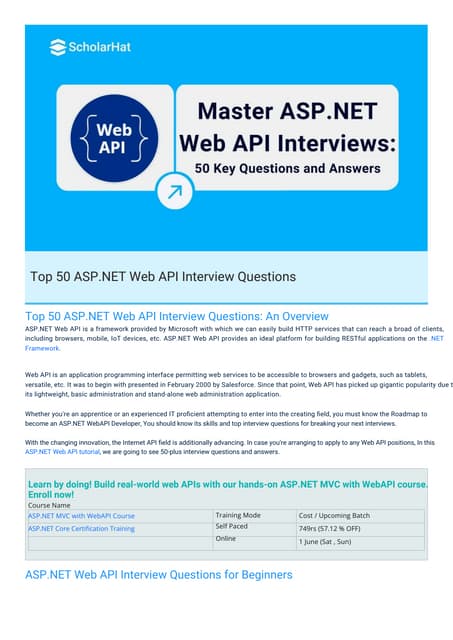



ASP.NET Web API Interview Questions By ScholarhatScholarhat
╠²
ASP.NET Web API Interview Questions By ScholarhatFunctional Muscle Testing of Facial Muscles.pdf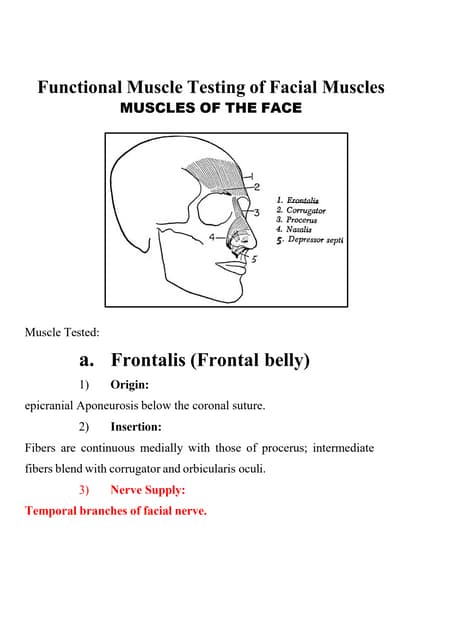



Functional Muscle Testing of Facial Muscles.pdfSamarHosni3
╠²
Functional Muscle Testing of Facial Muscles.pdfUnit 1 Computer Hardware for Educational Computing.pptx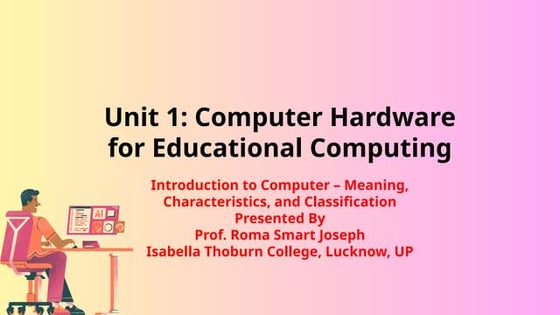



Unit 1 Computer Hardware for Educational Computing.pptxRomaSmart1
╠²
Computers have revolutionized various sectors, including education, by enhancing learning experiences and making information more accessible. This presentation, "Computer Hardware for Educational Computing," introduces the fundamental aspects of computers, including their definition, characteristics, classification, and significance in the educational domain. Understanding these concepts helps educators and students leverage technology for more effective learning.Administrative bodies( D and C Act, 1940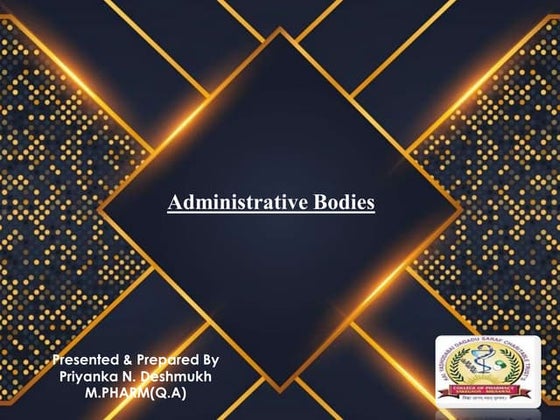



Administrative bodies( D and C Act, 1940P.N.DESHMUKH
╠²
These presentation include information about administrative bodies such as D.T.A.B
CDL AND DCC, etc.How to Configure Recurring Revenue in Odoo 17 CRM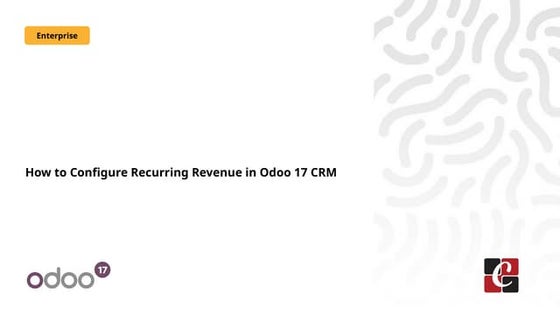



How to Configure Recurring Revenue in Odoo 17 CRMCeline George
╠²
This slide will represent how to configure Recurring revenue. Recurring revenue are the income generated at a particular interval. Typically, the interval can be monthly, yearly, or we can customize the intervals for a product or service based on its subscription or contract. Blind spots in AI and Formulation Science, IFPAC 2025.pdf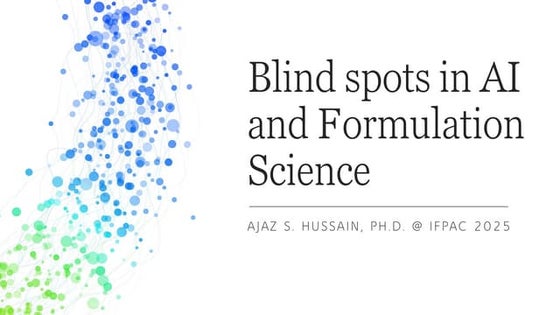



Blind spots in AI and Formulation Science, IFPAC 2025.pdfAjaz Hussain
╠²
The intersection of AI and pharmaceutical formulation science highlights significant blind spotsŌĆösystemic gaps in pharmaceutical development, regulatory oversight, quality assurance, and the ethical use of AIŌĆöthat could jeopardize patient safety and undermine public trust. To move forward effectively, we must address these normalized blind spots, which may arise from outdated assumptions, errors, gaps in previous knowledge, and biases in language or regulatory inertia. This is essential to ensure that AI and formulation science are developed as tools for patient-centered and ethical healthcare.Year 10 The Senior Phase Session 3 Term 1.pptx



Year 10 The Senior Phase Session 3 Term 1.pptxmansk2
╠²
Year 10 The Senior Phase Session 3 Term 1.pptxEffective Product Variant Management in Odoo 18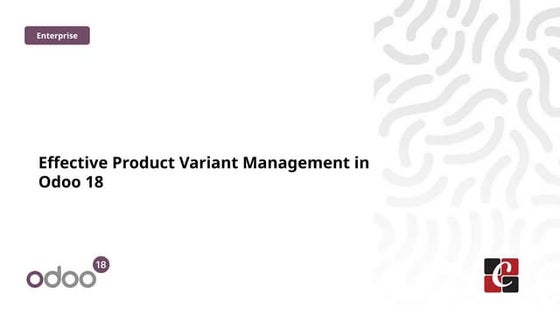



Effective Product Variant Management in Odoo 18Celine George
╠²
In this slide weŌĆÖll discuss on the effective product variant management in Odoo 18. Odoo concentrates on managing product variations and offers a distinct area for doing so. Product variants provide unique characteristics like size and color to single products, which can be managed at the product template level for all attributes and variants or at the variant level for individual variants.Comprehensive Guide to Antibiotics & Beta-Lactam Antibiotics.pptx



Comprehensive Guide to Antibiotics & Beta-Lactam Antibiotics.pptxSamruddhi Khonde
╠²
¤ōó Comprehensive Guide to Antibiotics & Beta-Lactam Antibiotics
¤ö¼ Antibiotics have revolutionized medicine, playing a crucial role in combating bacterial infections. Among them, Beta-Lactam antibiotics remain the most widely used class due to their effectiveness against Gram-positive and Gram-negative bacteria. This guide provides a detailed overview of their history, classification, chemical structures, mode of action, resistance mechanisms, SAR, and clinical applications.
¤ōī What YouŌĆÖll Learn in This Presentation
Ō£ģ History & Evolution of Antibiotics
Ō£ģ Cell Wall Structure of Gram-Positive & Gram-Negative Bacteria
Ō£ģ Beta-Lactam Antibiotics: Classification & Subtypes
Ō£ģ Penicillins, Cephalosporins, Carbapenems & Monobactams
Ō£ģ Mode of Action (MOA) & Structure-Activity Relationship (SAR)
Ō£ģ Beta-Lactamase Inhibitors & Resistance Mechanisms
Ō£ģ Clinical Applications & Challenges.
¤ÜĆ Why You Should Check This Out?
Essential for pharmacy, medical & life sciences students.
Provides insights into antibiotic resistance & pharmaceutical trends.
Useful for healthcare professionals & researchers in drug discovery.
¤æē Swipe through & explore the world of antibiotics today!
¤öö Like, Share & Follow for more in-depth pharma insights!One Click RFQ Cancellation in Odoo 18 - Odoo ║▌║▌▀Żs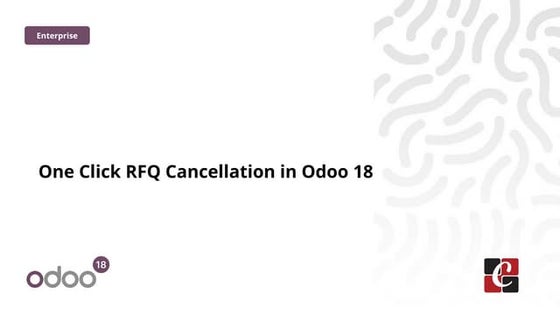



One Click RFQ Cancellation in Odoo 18 - Odoo ║▌║▌▀ŻsCeline George
╠²
In this slide, weŌĆÖll discuss the one click RFQ Cancellation in odoo 18. One-Click RFQ Cancellation in Odoo 18 is a feature that allows users to quickly and easily cancel Request for Quotations (RFQs) with a single click.Azure Data Engineer Interview Questions By ScholarHat



Azure Data Engineer Interview Questions By ScholarHatScholarhat
╠²
Azure Data Engineer Interview Questions By ScholarHatMeeting the needs of modern students?, Selina McCoy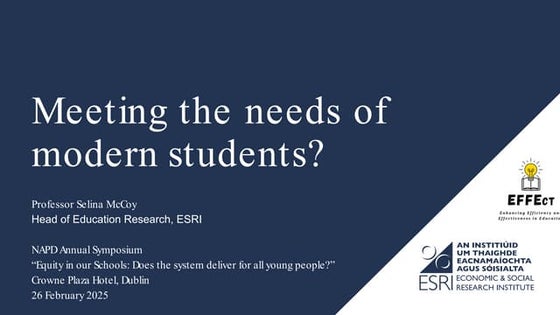



Meeting the needs of modern students?, Selina McCoyEconomic and Social Research Institute
╠²
NAPD Annual Symposium
ŌĆ£Equity in our Schools: Does the system deliver for all young people?ŌĆØAzure Administrator Interview Questions By ScholarHat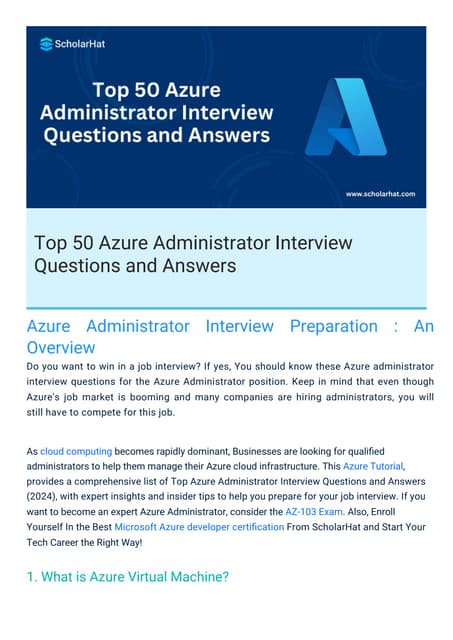



Azure Administrator Interview Questions By ScholarHatScholarhat
╠²
Azure Administrator Interview Questions By ScholarHatBISNIS BERKAH BERANGKAT KE MEKKAH ISTIKMAL SYARIAH



BISNIS BERKAH BERANGKAT KE MEKKAH ISTIKMAL SYARIAHcoacharyasetiyaki
╠²
BISNIS BERKAH BERANGKAT KE MEKKAH ISTIKMAL SYARIAHEntity Framework Interview Questions PDF By ScholarHat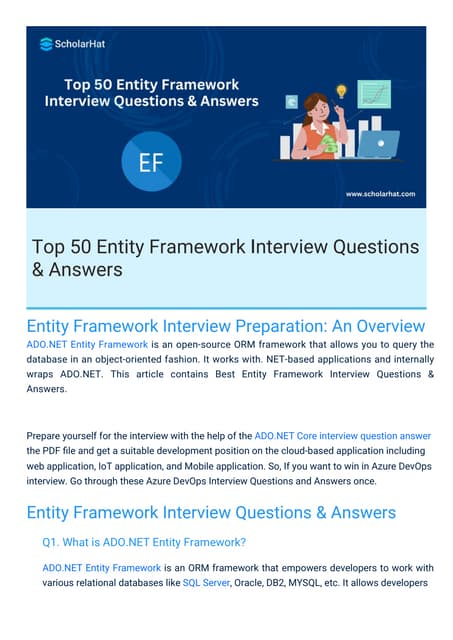



Entity Framework Interview Questions PDF By ScholarHatScholarhat
╠²
Entity Framework Interview Questions PDF By ScholarHatHelping Autistic Girls Shine Webinar ║▌║▌▀Żs



Helping Autistic Girls Shine Webinar ║▌║▌▀ŻsPooky Knightsmith
╠²
For more information about my speaking and training work, visit: https://www.pookyknightsmith.com/speaking/Chapter 2. Strategic Management: Corporate Governance.pdf



Chapter 2. Strategic Management: Corporate Governance.pdfRommel Regala
╠²
This course provides students with a comprehensive understanding of strategic management principles, frameworks, and applications in business. It explores strategic planning, environmental analysis, corporate governance, business ethics, and sustainability. The course integrates Sustainable Development Goals (SDGs) to enhance global and ethical perspectives in decision-making.Lesson 3 Phil. Politics.pptx Power of the government
- 2. 1 2 3 4 The Consequences of Power. Powers Exercised Political Leaders The Types of Power The Nature of Power
- 3. The Nature of Power The state exercises powers as a corporate body of politics. Political leaders also wield power which they derive from their positions. The powers exercised by the State and the political leaders can be beneficial to some and detrimental to others. If the use of such authority results in oppression, relief may be obtained through the courts. But this is only true in countries which have a strong judiciary.
- 4. The Nature of Power Democratic governments pride themselves in having independent courts. In authoritarian states, the justice system is devoted to the defense of the status quo and cannot be expected to uphold individual liberties. Court officials in authoritarian states are mere apologists for the existing structure and do not serve as a check and balance for government excesses.
- 5. You exercise power when you can get people to do things which they may not do of their own accord. The element of compulsion is evident. people act according to what you want them to do because they are compelled to do so. Power in different means: ’āś Power as Decision making ’āś Power as Agenda setting ’āś Power as Through control
- 6. Power as Decision-Making ŌĆó The exercise of power often involves decision-making, In any organization the leaders are empowered to make decisions. ŌĆó The decisions are enforced on the members of the organization through what Keith Boulding (1989) describes as force or intimidation (the stick), productive exchanges involving mutual gain (the deal), or the creation of obligations, loyalty, and commitment. ŌĆó Justices and judges exercise power by promulgating decisions which settle judicial controversies. ŌĆó The implication of this view of power is that the most powerful actors in society are those whose opinion are considered and upheld in the decision making. The powerful are able to get what they want and make others behave the way they wanted them to.
- 7. Power as Decision-Making ŌĆó Government executives, whether elective or appointive, also make decisions on a day-today basis on the operations of their offices and on their transactions with the public. ŌĆó The bicameral legislature (the Congress) likewise performs some decision-making through the laws it enacts and matters it subjects to legislative inquiry.
- 8. Under Section 21 of Article IV of the 1987 Constitution, the Senate or the House of Representatives may conduct -inquiries in aid of legislation. If the official is connected to the political party in power. lawmakers connected to that party may choose not to conduct any inquiry about the official in Order to avoid any embarrassment to the party, and merely excuse themselves by saying that the courts have jurisdiction over the matter. Power as Agenda Setting Power may also be exercised through what Bachrach, and Baratz (1962) describe as the capacity to prevent the making decisions. or ŌĆónon- decision-making." If a person dictates or decides the agenda in a group. unwanted issues or suggestions will not be discussed
- 9. Power as Thought Control Power may also be seen through the capacity to shape a person's thoughts, wants, or needs. In repressive states citizens undergo brainwashing and mind control in which the virtues of ideology are constantly drummed up in their consciousness. Propaganda is repeatedly broadcast and disseminated to shape individual thoughts and actions.
- 10. Three Dimensions of Power (Written by Michael Valdivieso)
- 11. Three Dimensions of Power (Written by Michael Valdivieso)
- 12. ’é¦ Power has been an important aspect of human civilization since time immemorial. ’é¦ Power might be physical, political or social. In the context of business as well, power dynamics tend to influence decisions and people transactions heavily. ’é¦ Power basically emanates from position or authority which can influence people both positively and negatively.
- 14. Coercive Power ’é¦ This kind of power involves the usage of threat to make people do what one desires. In the organizational set up, it translates into threatening someone with transfer, firing, demotions etc. it basically forces people to submit to oneŌĆÖs demand for the fear of losing something.
- 15. ’é¦ This type of power uses rewards, perks, new projects or training opportunities, better roles, and monetary benefits to influence people. However, an interesting aspect of this type of power is that it is not powerful enough in itself, as decisions related to rewards do not rest solely with the person promising them, because in organizations, a lot of other people come into play like senior managers and board.
- 16. Legitimate Power ’é¦ The target person complies because he or she believes the agent has the right to make the request and the target person has the obligation to comply. ’é¦ This ability to influence others through the use of position or authority. ItŌĆÖs derived from your role in an organization or society, and itŌĆÖs often accompanied by respect and admiration from others.
- 17. ’é¦ This is a personal kind of power which owes its genesis to the skills and expertise possessed by an individual, which is of higher quality and not easily available. The person can exercise the power of knowledge to influence people..
- 18. Referent Power ’é¦ This is the ability of an individual to influence others by virtue of his or her personal characteristics. They are admired, trusted, and respected.


















